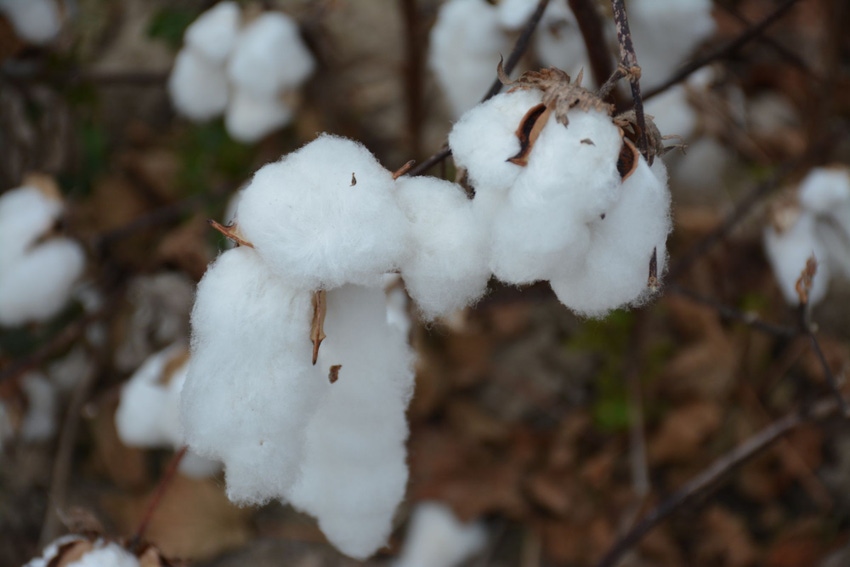
If you want to test a product that promises to alleviate the effect of water stress, there aren’t many places better than the cotton fields of west Texas. Some producers in the region have experienced droughts in four or five of the last six years.
So that’s where Indigo, a Boston, Mass.-based startup, went to test its new seed treatment product on cotton in 2016. Growers there used the seed treatment on about 40,000 acres out of a total of 50,000 acres planted with the product nationwide.
“I planted 40 acres with treated seed and 40 acres not treated, and I harvested it myself,” said Shawn Holladay, a producer who operates H2H Farms near Lamesa on the Texas High Plains. “Where the product was on the seed I got right at 60 pounds more to the acre or about an 11 percent increase.”
Indigo says that happens to be the average yield improvement for most of the test fields in west Texas. About 70 growers in the region were asked to test the product, which is derived from naturally-occurring, in-plant microbes or endophytes.
Indigo CEO David Perry says Indigo Cotton could be the first of a number of new seed treatment products in agriculture based on discoveries involving what’s being called the microbiome.
“All of the microbiome science really started on the human health side,” Perry said in an interview following the company’s announcement of the first-year results this morning. “In the last five or 10 years there’s been this explosion of information about how microbes impact human health.
“It’s probably the most important human health discovery in the last 10 years. There’s now credible science that suggests the microbes that live in and on our body have a big impact on whether we’re likely to get an infectious disease or allergies or inflammation or even heart disease and cancer.”
A number of biotech companies are now working on new therapeutics that aren’t drugs but are capsules of microbes intended to change the microbes in the human stomach and treat some conditions. Example: Taking microbes from the stomach of a fat person and moving them to that of a skinny person can help the latter gain weight.
Humans lived in symbiosis with these microbes for centuries until antibiotics removed them from the system. The antibiotics were needed to fight other diseases, but now some of these companies are adding the beneficial microbes back to the human body through therapeutics.
“What we’re doing at Indigo is piggybacking on that research and applying it to agriculture,” said Perry. “In agriculture, plants had even longer – maybe 150 million years – to coexist with these microbes, and that worked beautifully until discoveries of modern agricultural practices eliminated some of the microbes.
“It’s not that those technologies – insecticides, herbicides and, especially, fungicides – were bad. They probably helped us feed a billion people we wouldn’t have been able to feed, but we unintentionally eliminated a lot of the good microbes, too.”
Indigo is trying to identify those beneficial microbes, “And then add them back to plants, initially in the form of seed coatings, to improve the health of plants,” said Perry. “Healthier plants yield more and are more resistant to disease.”
Data from the first year of the studies were presented at the Beltwide Cotton Conference by Gregory Sword, professor of entomology at Texas A&M University.
Despite parts of the state experiencing moderate to severe water stress during the growing season, yield improvements were achieved without increased water or chemical use, Dr. Sword said, noting the most successful combination of seed type and microbial treatment achieved a peak performance above 15 percent.
The data are consistent with the results of four years of controlled field trials, and they have informed Indigo’s 2017 product selection, as the company identifies the most effective combination of microbial treatment, seed variety, and other conditions.
“Indigo has transformed a promising discovery into a product that can perform at scale to deliver substantial yield increases on modern commercial farms,” says Dr. Sword. “The application of the plant microbiome to agriculture represents a naturally derived solution that works to address today’s environmental stresses, with the potential to dramatically improve long-term agricultural sustainability.”
“These results represent another promising step in what we hope will be the next significant innovation in agriculture,” said Perry. “One of the advantages of Indigo’s unique partnership model with growers is that we can gather this type of data from commercial fields, which helps us to improve applications of the plant microbiome, in cotton and other crops, in years to come.”
For more information, you can watch a video that features Perry, Holladay Dr. Sword. Click here.
About the Author(s)
You May Also Like






